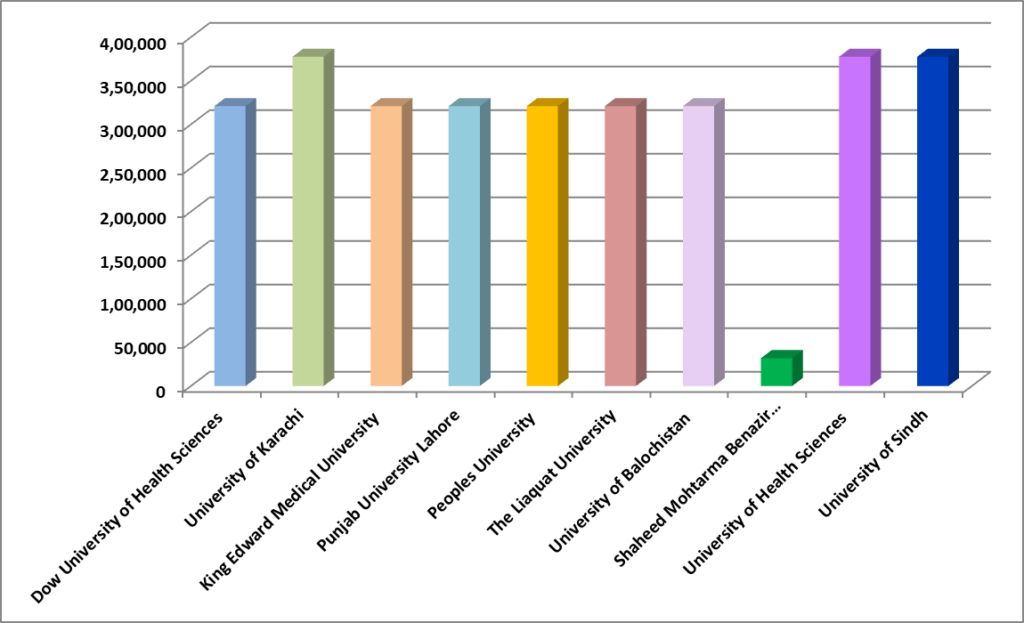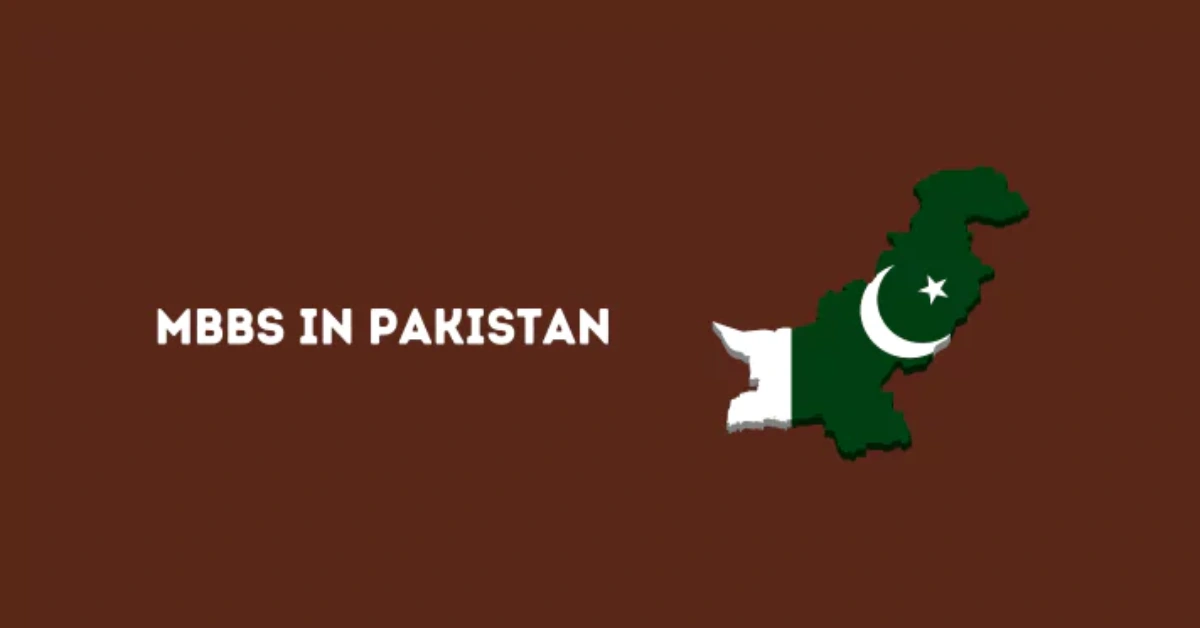MBBS in Pakistan: Pakistan is a country in South Asia. It is the world’s fifth-most populous country, with a population of almost 242 million, and has the world’s second-largest Muslim population. MBBS Stands For Pakistan Bachelor of Medicine & Bachelor of Surgery. MBBS is considered a highly qualified and professional degree in Pakistan, and its value never diminished. It is a renowned and demandable profession worldwide. In Pakistan, a Doctor receives huge respect for his services to humanity.
In Pakistan, the best career for male and female students is medical. The most demanding field in medicine in Pakistan means you intend to join the medical profession in the future. You may wish to become an MBBS doctor.
[Index]
Country Summary
Pakistan is situated between the Karakoram mountain range, the Himalayas and China in the northeast, Afghanistan in the northwest, Iran in the southwest, the Arabian Sea in the south, and India in the east:
| Population | 22.09 crores |
| Area | 881,913 km² |
| Capital City | Islamabad |
| Language | Official Languages: Urdu/ English |
| Climate | cool, dry winter from December through February; a hot, dry spring from March through May; |
| Literacy Rate | 59.13% |
| Time Zone | (GMT+5) Pakistan Standard Time |
| Currency | Pakistani Rupee |
| Religion | 96.47% are Muslims, 2.14% Hindus, 1.27% Christians, 0.09% Ahmadis and 0.02% others. |
Quick facts
Before reading the complete information about MBBS in Pakistan, let’s look at some quick facts about studying MBBS in Pakistan:
| Course Offered | Doctor of Medicine Degree (equivalent to MBBS, India) |
| Course Duration | 5 – 6 Years (Depends on University) |
| Basic Eligibility | 10+2 (Science) with 50% – 70% in PCB (Depending on University) |
| Medium of Teaching | English/Urdu |
| Entrance Exam | National Medical and Dental College Admission Test (MDCAT) |
| Universities Recognition | WHO, FAIMER, UNESCO |
Recognition
The most critical factors in deciding on an excellent medical college are checking the affiliation, recognition, and other affiliating parameters. Pakistan MBBS Colleges are affiliated with these authorities:
- Ministry of Education, Pakistan.
- WHO (World Health Organization)
- ECFMG (Educational Commission for Foreign Medical Graduates)
- WFME (World Federation for Medical Education)
- FAIMER (The Foundation for Advancement of International Medical Education and Research).
Admission Procedure 2025-26
To gain Admission to Pakistan, you must qualify for the National Medical and Dental College Admission Test (MDCAT). One must remember that you only have to be eligible for the exam. Here are the valuable resources for the MDCAT exam that will help you boost your preparation:
Eligibility Criteria 2025-26
If you want to study MBBS in Pakistan, check the eligibility below:
| Course Offered | Bachelor of Medicine and Bachelor of Surgery (MBBS) |
| Course Duration | 6 Years |
| Basic Eligibility | Class 12th in Science, with PCB and English subjects from a board recognized by the authorities in India. |
| Medium of Teaching | English language |
| Universities Recognition | Pakistan Medical Commission (PMC)1 & WHO |
Colleges Seats
Medical seats in Pakistan are allocated primarily based on merit through national or provincial entrance examinations, such as MDCAT (Medical and Dental College Admission Test):
| Province | Public | Private | Total |
|---|---|---|---|
| Azad Kashmir | 330 | 100 | 430 |
| Balochistan | 320 | 100 | 420 |
| Khyber Pakhtunkhwa | 1435 | 1050 | 2485 |
| Punjab and Islamabad | 4200 | 4900 | 8680 |
| Sindh | 2400 | 1850 | 4250 |
| Total | 8265 | 8000 | 16265 |
Number of Registered Medical Colleges
In this selection, we will inform you about the number of registered medical colleges in Pakistan:
| Province/Territory | Public | Private | Total |
|---|---|---|---|
| Azad Kashmir | 3 | 1 | 4 |
| Balochistan | 1 | 1 | 2 |
| Khyber Pakhtunkhwa | 10 | 10 | 20 |
| Punjab and Islamabad | 19 | 43 | 62 |
| Sindh | 12 | 17 | 29 |
| Total | 45 | 72 | 117 |
Documents Required
Before admission to Top MBBS Colleges in Pakistan, please do not forget to carry all these related documents:
- Matriculation (SSC) certificate or result card issued by concerned BISE/Equivalence Certificate of O-Level, etc., issued by the IBCC
- HSSC Pre-Medical result issued by concerned BISE /Equivalence Certificate of foreign examination (A-Level, IB, American 12th Grade, etc.) issued by the IBCC. The candidates having foreign qualifications shall also upload their original results issued by the foreign university/board/school showing their grades in science subjects (Biology, Chemistry and Physics/Mathematics);
- The candidates having foreign qualifications equivalent to Pakistani HSSC (e.g., A-Level, IB, American 12th Grade, etc.) shall have to submit, along with their Equivalence Certificate, a Letter of Equivalence of Grades in Science Subjects (i.e., Biology, Chemistry and Physics/Mathematics), issued separately by IBCC. This is mandatory because, per the Pakistan Medical Commission’s (PMC) directions, the merit shall be calculated by using the marks in science subjects only on the HSSC/equivalent exam.
- MDCAT result card issued by the Pakistan Medical Commission (PMC). The repeating candidates can use their MDCAT-2025 result, however, in their applications, they will enter the score as equated by the PMC for this year.
- Domicile certificate of the candidate (In the case of Overseas Pakistanis/Dual Nationality Holders category only, Punjab domicile of Overseas Father/Mother shall also be acceptable for candidates born outside Pakistan).
- Valid CNIC/CRC/NICOP/Passport of the candidate.
- Valid CNIC/NICOP/Passport of the candidate’s father/mother.
- A recent passport-size colour photograph of the candidate taken on a white or sky-blue background
- Specimen signatures and left thumb impression (LTI) of the candidate in blue/black ink on white paper.
- The hifz-e-Quran Certificate was issued by the Wafaq ul Madaris in the case of Pakistani candidates and the relevant national authority in the case of overseas candidates (only for candidates claiming to be Huffaz-e-Quran).
MBBS Syllabus
Studies suggest that before going to Pakistan for medical school, one should compare the MBBS syllabus of some of Pakistan’s top-ranked medical universities:
| Name | Semester | Subjects |
| Pre Clinical | Semester 1 – 2 | Anatomy, Biochemistry, Physiology |
| Para Clinical | Semester 3 – 5 | Community Medicine, Forensic Medicine, Pathology, Pharmacology, Microbiology, Clinical postings, OPDs |
| Clinical | Semester 6 – 9 | Community medicine and allied subjects (Psychiatry, Dermatology), Obstetrics and Gynecology, Pediatrics, Surgery, and allied subjects, Clinical postings |
12 Months Rotary Internship
| Subject Name* | Duration |
| Medicine | 1.5 Months |
| Ophthalmology | 15 Days |
| Surgery | 1.5 Months |
| Anaesthesiology | 15 Days |
| Pediatrics | 1 Month |
| Obstetrics and Gynaecology | 1 Month |
| Rural | 3 Months |
| Casualty | 1 Month |
| Elective | 2 Months |
The course structure and topics are subject to change from university to university.
Fee Structure
Below is the updated 2025-26 list of all Medical or MBBS Colleges in Pakistan officially made by the Pakistan Medical & Dental Council (PMDC). To get detailed info about the fee structure, courses offered, admission procedure, placement stats, cut-off, and facilities available and complete the college review, click the college link or read more link. It will provide a list of the best medical colleges:
| S.No. | Name of Colleges | Fee Structure |
| 1. | Dow University of Health Sciences Karachi | 3,20,933/Year |
| 2. | University of Karachi | 3,77,498/Year |
| 3. | King Edward Medical University Lahore | 3,20,933/Year |
| 4. | Punjab University Lahore | 3,20,933/Year |
| 5. | Peoples University of Medical & Health Sciences for Women Sindh | 3,20,933/Year |
| 6. | The Liaquat University of Medical and Health Sciences Sindh | 3,20,933/Year |
| 7. | University of Balochistan Quetta | 3,20,933/Year |
| 8. | Shaheed Mohtarma Benazir Bhutto Medical University Sindh | 31,900/Year |
| 9. | University of Health Sciences Lahore | 3,77,498/Year |
| 10. | University of Sindh | 3,77,498/Year |
Top MBBS Colleges in Pakistan with Fee Structure (Graphical Representation)

Advantages and Disadvantages
Do you know that the Ministry of Education oversees education in Pakistan? The first university was founded in 1367 in Pécs, the Southern region of Pakistan. Today, there are 65 higher education institutions in Pakistan, ranging from minor universities of applied sciences to top research universities. There are a lot of advantages to studying in Pakistan. Here are just a few:
Advantages of Studying MBBS in Pakistan
- Affordability: Pakistan offers an affordable medical education compared to many other countries, making it accessible to a broader range of students.
- High-Quality Education: Pakistani medical universities are known for their high education standards and experienced faculty.
- English-Medium Programs: Most MBBS programs in Pakistan are conducted in English, eliminating language barriers for international students.
- State-of-the-Art Facilities: Many universities have invested in modern facilities and equipment, providing students with a quality learning environment.
- Diverse Clinical Exposure: Pakistan’s diverse population ensures students encounter various clinical cases during their studies.
- Global Recognition: Pakistani medical degrees are widely accepted internationally, allowing graduates to pursue medical careers worldwide.
- Cultural Experience: Studying in Pakistan offers an immersive cultural experience, broadening students’ horizons and enhancing their communication skills.
- Scholarship Opportunities: Various scholarships and financial aid programs are available for international students.
- Lower Cost of Living: Pakistan has a relatively low cost of living, making it budget-friendly for students.
- Global Networking: Studying in Pakistan enables students to build international connections and friendships that can benefit their future medical careers.
Disadvantages of Studying MBBS in Pakistan
- Language Barriers: Potential language challenges despite English-medium programs.
- Security Concerns: Safety issues in specific regions may be a concern.
- Cultural Adjustment: Adapting to a new cultural environment can be challenging.
- Limited Scholarships: Scholarship opportunities for international students may be limited.
- Bureaucratic Processes: Visa and administrative procedures can be time-consuming.
- Variable Infrastructure: The quality of facilities may vary among medical universities.
- Recognition Challenges: Some countries may have specific requirements for practising medicine.
- Competitive Admissions: Securing admission to medical schools can be highly competitive.
- Limited Electives: Restrictions on elective subjects or clinical rotations may apply.
- Cultural Distance: Significant cultural differences may lead to homesickness and adjustment difficulties.
- https://pmdc.pk/, PMC Official website ↩︎


What is fee structure per year for a private student of frontier medical college abotabad ?
Why you don’t mention medical universities of khyber pakhtunkhawa’s fee per year for a student?
We are working on it.
I want admission in Medical University I want to become a doctor because it’s my aim for the year 2024. plz support me for this act
I want to know about admission fee and semester fee for other contry students and rules
NEET is the Indian test for MBBS. MDCAT is what it is in Pakistan.
Yes.
I want to study in a more advanced medical University 🥺 but I have not came in the merit list of MBBS students and I don’t want to repeat but I want to become a doctor😔
You should practice more for next time.